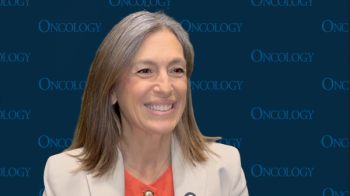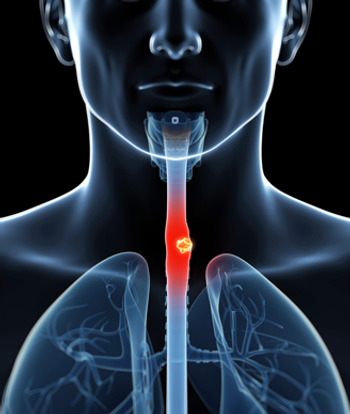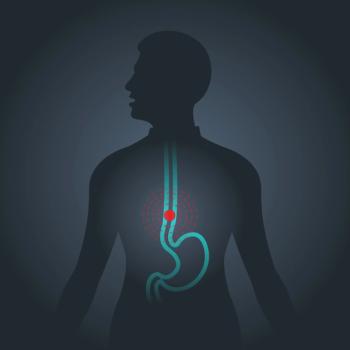
Oncology NEWS International
- Oncology NEWS International Vol 10 No 9
- Volume 10
- Issue 9
Preoperative Chemotherapy Shows Promise in Esophageal Cancer
SAN FRANCISCO-Two cycles of preoperative cisplatin (Platinol) and fluorouracil (5-FU) may improve survival in patients with resectable esophageal cancer, compared with surgery alone, according to a large study from the United Kingdom presented at the 37th Annual Meeting of the American Society of Clinical Oncology (ASCO abstract 502).
SAN FRANCISCOTwo cycles of preoperative cisplatin (Platinol) and fluorouracil (5-FU) may improve survival in patients with resectable esophageal cancer, compared with surgery alone, according to a large study from the United Kingdom presented at the 37th Annual Meeting of the American Society of Clinical Oncology (ASCO abstract 502).
Peter Clark, MD, of the Medical Research Council (MRC) Clinical Trials Unit, London, UK, presented the results of a randomized controlled trial conducted by the UK MRC Upper GI Tract Cancer Group.
Between 1992 and 1998, the study enrolled 802 previously untreated patients with resectable esophageal cancer. The average patient was a 62-year old man with adenocarcinoma of the lower third of the esophagus.
"Tumors of the lower esophagus have become relatively common among white males in their 50s, for reasons that are unclear," Dr. Clark said at a press conference. "This cancer is tough to treat because it is frequently inoperable and frequently presents with distant spread."
He noted that small institutional studies have suggested that chemotherapy may increase the chances for complete resection and may reduce the risk of secondary spread.
Patients were randomized to surgical resection or to two 4-day cycles 3 weeks apart of cisplatin 80 mg/m² by 4-hour infusion plus fluorouracil 1 g/m²/d by continuous infusion for 4 days, followed by resection. This chemotherapy regimen was standard treatment for esophageal cancer during the early 1990s, Dr. Clark commented.
Resection was considered complete in 78% of the chemotherapy group vs 70% of the surgical group (P < .001): 10% and 11% of patients, respectively, died within 30 days of resection.
Median survival was significantly improved with preoperative chemotherapy: 17.2 months vs 13.3 months for resection, for a difference of 3.9 months. Two-year survival rates were 43% and 34%, respectively, for a 9% difference in favor of preoperative chemotherapy, Dr. Clark reported.
Postoperative complications were similar, occurring in about 40% of each arm. At 1 year from randomization, dysphagia was improved but performance status was worse, the results being similar in the two treatment groups. There was no evidence of a different treatment effect according to histology, age, sex, tumor site, weight loss, performance status, or dysphagia.
The discussant, David Kelsen, MD, of Memorial Sloan-Kettering Cancer Center, noted that the results cannot be considered definitive. He pointed out that this form of therapy was not shown to improve survival in the Intergroup 113 trial, one of the largest studies to date on preoperative chemotherapy in patients with esophageal cancer. Consequently, he advised that preoperative chemotherapy should not yet be adopted as the new standard of care.
Dr. Clark said that the MRC study will be followed by a new study evaluating ways to improve preoperative chemotherapy using "better" preoperative chemotherapy with continuous infusion 5-FU plus cisplatin and epirubicin (Ellence) or preoperative chemotherapy plus radiotherapy.
Articles in this issue
over 24 years ago
Avon Launches ‘Kiss Goodbye to Breast Cancer’ Campaignover 24 years ago
Occult Tumor Cells in Marrow Predict Breast Cancer Survivalover 24 years ago
No Long-Term Advantage for Complete Response to Neoadjuvant Chemo/RTover 24 years ago
New Agents Tested with 5-FU in Rectal Cancerover 24 years ago
Anticonvulsants Can Alter Irinotecan Metabolismover 24 years ago
Thalidomide Appears Effective in Early-Stage Myelomaover 24 years ago
New ‘Goals for Pain Relief’ Scale Proves Reliable in Pilot Studyover 24 years ago
GVAX Autologous Vaccine Shows Activity in Lung CancerNewsletter
Stay up to date on recent advances in the multidisciplinary approach to cancer.



































